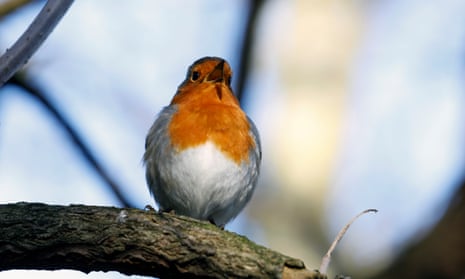It isn’t just people who get road rage. Robins in the countryside become more aggressive when they hear the sound of traffic, according to a study.
Beloved for their plump appearance, proud bearing and sweet song, European robins are actually fiercely competitive creatures, whose calls and behaviours are part of a struggle for territorial dominance fought daily with their neighbours.
When a robin arrives uninvited on another bird’s territory, they adapt their songs to ward the rival away, and adopt visual displays including swaying from side to side and menacingly baring their red chest feathers, before closing in and even going on the attack.
Previous studies had found that robins living in cities were more physically aggressive than their rural cousins. The latest research suggests that noise pollution could play a part.
To explore the connection, scientists from Anglia Ruskin University in the UK and Koç University in Turkey put a 3D-printed plastic model of a robin on another robin’s turf at two locations: an urban park in Istanbul that was close to busy roads, and a quiet wooded area on the outskirts of the city.
The model intruder was also equipped with recordings of robin songs. Then, through a separate speaker nearby, they added traffic noise.
“In normally quiet surroundings, we found that additional traffic noise leads to rural robins becoming more physically aggressive, for instance approaching the model bird more closely,” said Dr Çağlar Akçay, senior lecturer at Anglia Ruskin, who was the study’s lead author.
But when they played the extra traffic to the urban birds, they did not become any more aggressive – instead they responded by singing less, suggesting they had perhaps learned to “sit out” temporary increases in noise.
Akçay and his team speculated that the traffic noise was interfering with robins’ natural communication through song. “The chronic high levels of noise that exist day and night in urban habitats, such as from traffic or construction equipment, may permanently interfere with the efficient transmission of acoustic signals and this is likely to be the key reason why urban robins are typically more aggressive than rural birds,” he said
Higher levels of aggression were likely to make these birds’ lives more difficult, Akçay suggested. One hypothesis was that making more of a scene in response to a rival could make them more vulnerable to predators, particularly when their attention was focused on a rival.
after newsletter promotion
“They may not be aware of the predator, and they may not be able to fly away or run away quickly enough to protect themselves,” Akçay said.
“And indeed, in these small songbirds, often when they get into this really close fight, you can sometimes walk right up to them, and they wouldn’t even notice, so that you can almost grab them.
“Not quite, but almost.”
The study is published in the journal Behavioral Ecology and Sociobiology.










